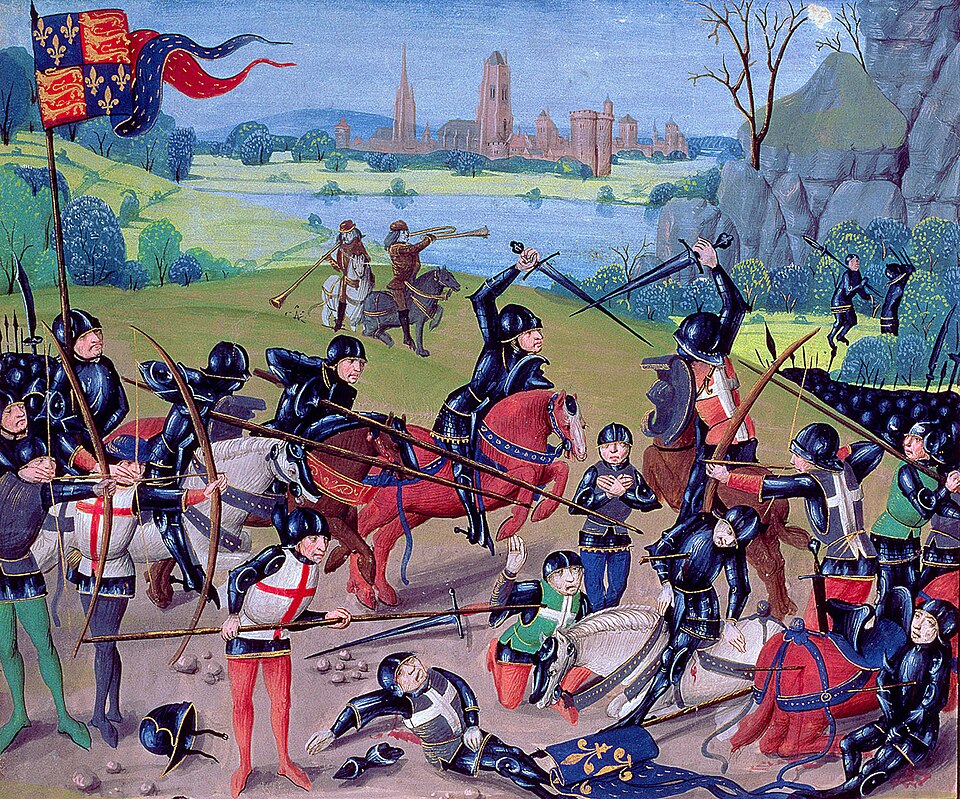
Did the Hundred Years War last for a hundred years? No, the Hundred Years War didn’t last a hundred years. In fact, it lasted for 116 years.
The thing we need to understand before we start talking about the Hundred Years War is that it was not one continuous war that lasted for over a hundred years. It was a series of smaller wars that were interrupted by other events, and even occasional times of peace. It has been called the Hundred Years War by historians because the causes of the wars were related. Although, by that metric, your could probably combine World War 1 and World War 2 into a single 30 Years War.
The Hundred Years War started in 1337 and it finished in 1453. It was a war between England and France and it was all fought in France. Charles IV of France died in 1328 without any sons or brothers. The throne passed to his nephew, Philip VI, who was the son of Charles’s sister. At the time, kings of England had about the same amount of claim to the French throne as kings of France because of William the Conqueror in 1066. He had been the Duke of Normandy and he started a series of diplomatic marriages between both countries. By the time of Edward III, 1327-1377, it was very confusing. Edward III did actually have a good claim to the French throne due to his lineage, but not a very strong one by French law. His father was Edward II of England and his mother was Isabella of France, who was the daughter of Philip IV, a previous king of France. This made Edward III the grandson of Philip IV. Technically, this was stronger claim than Philip VI, who was only a nephew. However, French law had changed to give more strength to inheritance through the male line than the female line and Edward’s claim was through his mother, not his father.
At the time of Philip VI’s ascension to the throne, England controlled a few areas in France, down where Gascony is now and England was at war with Scotland. Edward III feared that Philip VI would invade England to help Scotland. Philip VI was possibly planning this, but before he could he decided to take back the English lands in France. In retaliation, Edward III decided to use his claim to the throne of France and combine the two countries, with himself as ruler. The king of France, Philip VI, didn’t think that was a particularly good idea. And this was one of the causes for the war that killed probably way over 100,000 people. There are many others, but this was the trigger. Incidentally, it is almost impossible to know how many people died in all of the battles that made up the Hundred Years War, and that is further confused by the fact that the Black Death terrorized Europe in the middle.
The English had far more military success than the French did and a large number of the soldiers that died were on the French side. There are many reasons for this. France is a much larger country and it was very politically divided at the time. It was difficult for Philip VI to assemble an organized and unified army to fight the English. The English also employed longbowmen, who were deadly in a battle. However, there was never a point where the English came close to a complete and total conquest of France. And even if they had done, there was no way they would have been able to hold it.
Here is a whistlestop tour of the Hundred Years War. The war started in 1337 and Edward III was able to push into France. Philip VI died in 1350 and Edward was able to capture his successor, John II. Edward managed to make John II sign over a lot of land to him in 1360. John’s son, Charles V became king in 1364, and he was able to recover most of the land lost to the English. There was a slowdown in the fighting for about three years while the Black Death decimated Europe, killing about 30 million people. The resultant economic situation hurt both kingdoms, but England bounced back faster. Edward III had died in 1377, but the desire to rule France continued in the minds of kings. The war quieted down for a while until Henry V came to the throne of England. He reentered France and won a number of significant victories. The battle of Agincourt is probably the most famous, thanks to Shakespeare’s play. Henry managed to make some powerful alliances in France and nearly controlled half of the country when he suddenly died at the age of 35. His son, Henry VI, was not as competent a military leader and France had several notable victories, pushing the English out of France, everywhere except for around Calais. The last battle was in 1453. So, after 116 years of war, instead of taking the French throne, England ended up with less land in France than they had started with. And this is what I learned today.
Sources
https://en.wikipedia.org/wiki/Hundred_Years%27_War
https://en.wikipedia.org/wiki/Charles_V_of_France
https://en.wikipedia.org/wiki/Edward_III_of_England
https://en.wikipedia.org/wiki/Henry_V_of_England
https://en.wikipedia.org/wiki/Isabella_of_France
https://www.history.com/articles/hundred-years-war
https://www.history.com/articles/how-long-was-the-hundred-years-war
https://historum.com/t/hundred-years-war-casualties.196630
https://en.wikipedia.org/wiki/Philip_VI_of_France
https://en.wikipedia.org/wiki/William_the_Conqueror
Image By Unknown – Ms 6 f.243 Battle of Agincourt, 1415, English with Flemish illuminations, from the ‘St. Alban’s Chronicle’ by Thomas Walsingham (vellum), English School, (15th century) – Lambeth Palace Library, London, UK / The Bridgeman Art Library, Public Domain, https://commons.wikimedia.org/w/index.php?curid=139585
